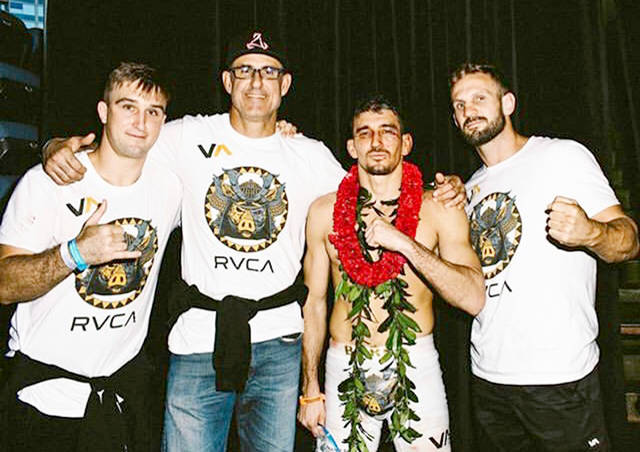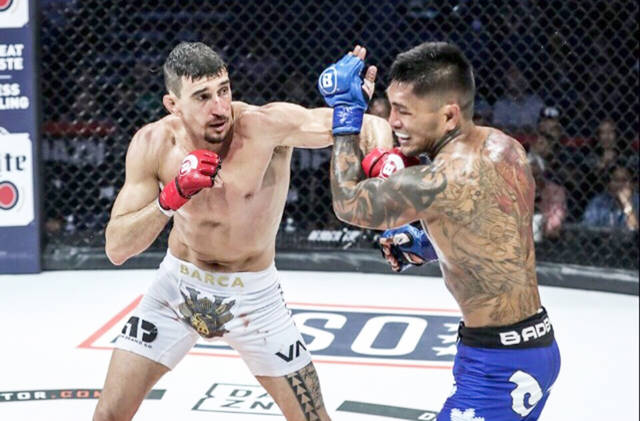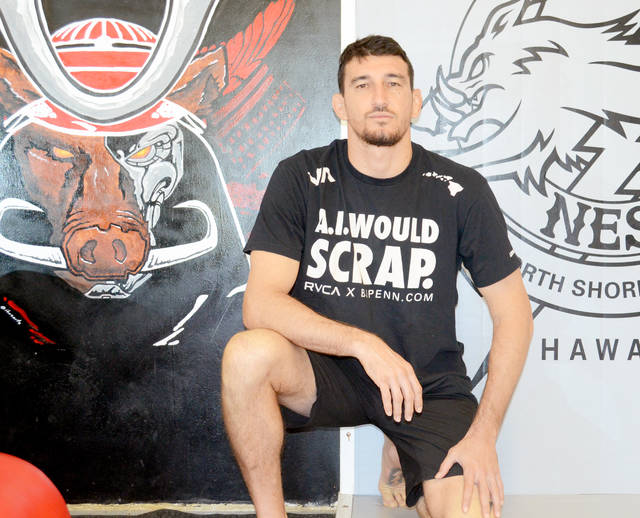Talk Story: Dustin Barca



Dustin Barca has lived a rather eclectic life.
The mixed martial arts fighter from Kilauea was a pro surfer, a one-time Kauai mayoral candidate and for a time owned a farm.
But life has dealt Barca a few blows over the past few years — his fight career was held up because of injuries, he lost in his bid for mayor, and then he lost his farm following the floods last April.
But he finally got a win, one he felt he needed after one disappointment after another.
After a five-year ring absence, Barca fought in the preliminaries of “Bellator 213: Macfarlane vs. Letourneau” last month in Honolulu. He won via split decision.
“I felt like I got to breathe again. I got to live again. I gained my self-respect back, my dignity back,” he said.
Barca sat down with TGI in his home in Kilauea, where his training gym “Boars Nest MMA” is also located, and talked about the ups and downs he’s experienced over the last few years.
It’s been about a month since the show. What can you say about it now?
I was blessed to be part of that show. It was the biggest show in Hawaii. I was lucky. I haven’t fought for five years. Just to get on the show was a pretty big blessing for me.
I know the promoter. I fought for him in other promotions. He knows that I put on a good show every time I fight, and he knows I have a big following. He thought it would be good for the show.
Any updates on an upcoming fight?
It’s still in the works. I haven’t committed to anything, but I’m looking to fight in the next six months.
I’m trying to get into Bellator or something big where I can compensated for my time. … I signed the contract (with Bellator). I think it was just for one fight that time, but I’m pretty confident that they’ll give me another shot to fight.
You returned to fighting after a five-year absence. How did it feel to be back into things?
It’s amazing. I felt alive again. I’ve been through so much — doing the political thing, then losing my farm in the flood. Just life. Just working a lot, and then just letting it all go and letting out all those years of frustration. I feel like I can let it all go, and it just made me feel alive again. That’s the best way I can put it.
What farm did you have?
It was a seven-acre farm in Kealia. There was two floods in a row that got me, but that last one (in April) ended my career over there. I had it for four years. I pretty much built a big farm out of just bushes. I fenced the whole property. I had sheep, horses and about 100 pigs. I had an acre of vegetables. … Four years of building and creating a farm. That flood, it didn’t take out my buildings, but it killed a majority of my animals and it muddied the whole property. It was just bad.
How difficult was it to make that choice to leave that behind?
It was kind of like a sign to just step away, give more time to my family and put more energy into my gym.
Do you have another job outside of fighting?
I teach boxing, and that’s kind of the main job. I had a landscaping business and then the farm. I work security and other miscellaneous things.
I just try to bring in a little bit of money every day to my family. That’s the main goal.
How long were you a pro surfer?
I was a pro surfer for about 15 years. I started doing professional contests when I was 14 years old. I was doing NSSA, but I was also doing ASP, which is the professional tour. I was already being paid a little money by sponsors and getting at that level. So, I started super young, ended up being one of the top 44 surfers in the world.
And then I just got burnt out by the time I was 28 years old. I had already trained jiu-jitsu here, at Longman Jiu-Jitsu (in Kilauea). I kind of got turned off by surfing and turned on to martial arts because of the humility. I’d meet the toughest people in the world, like world-champion fighters, and they’re the nicest people in the world. I was around all these surfers that thought they were the toughest guys in the world, just super-big egos. It just wasn’t for me anymore.
How well did you do in surfing?
I won some events, and I got a lot of second places. There’s a qualifying tour to get on to the top tour. There was like 13 people every year that qualified for the top tour. I did that for two years, like, super-serious.
All the other years, it wasn’t as serious. It was kind of like a bachelor tour — parties everywhere and blah blah. When I really took it serious, I made the tour. Did that for a couple of years.
I was traveling by myself all over the world. It super boring and lonely. I had my first son, and I was missing the first year of his life. I just stepped away from it.
Was there any part of your surfing career, despite the things you didn’t like, that was really worthwhile?
Yeah. Some of the finals I made was with really good friends. It was just us in the finals, in huge contests for good money. It was good experiences. It was memories for a lifetime. I wouldn’t take back or change anything I’ve done in my life. It was a big part of what made me who I am today.
So was it after surfing that you got into MMA?
I was just training (jiu-jitsu) and surfing still. My friend, Andy Irons, passed away. He’s like my big brother. He was one of my best friends.
After that, I was like, “Life’s short.” I wanted to fight, but I was scared to, pretty much. After I lost him, I realized how short life is, and that if there’s anything you want to do in life, go and do it. That’s when I started committing to fights.
You reminded me, I saw the documentary about Andy Irons. You were in it. What was that like for you?
It’s hard for all of us to take a trip down memory lane again, but I think the movie is amazing. It’s helping a lot of people that have had the same problems. It’s an in-your-face way of looking at yourself if you have those kinds of problems.
I think the movie is pretty amazing in that way. From talking with his mom and his wife, we’re super close with them. Just hearing how people’s lives are changing and how they’re contacting them and how much the movie’s helped their life, it’s made them realize what could happen to them (if they’re bipolar or if they have a drug problem). So, it’s helping a lot of people.
Was there anything or any story about Andy that didn’t make the final cut but you wish that it did, positive or negative?
They told the story pretty darn good, but just the fact that he always had time for kids or people who were his fans or kids around town, that’s one thing that was special about him. You see a lot of people who are famous that won’t take a picture with somebody. He was one of those people that always felt that it was super cool that some kid wanted to take a picture with him. He never lost that humility.
Then how did you transition to MMA?
They were putting on these (local shows). There was two organizations that ran fights here. I knew a couple of guys who were putting the fights here. We took one amateur fight. It was supposed to be pro. I was supposed to go straight to pro because we felt like I was at that level already. I was training for a long time. It was supposed to be pro, but they said the first guy backed out, and then the next guys was supposed to go pro but it was going to be his last amateur fight. We did one amateur fight, and that ended in 90 seconds — choked the guy out in 90 seconds. It was pretty quick, and we were just like, “Let’s just step it up and go pro.”
Then, I got the opportunity to fight in ProElite at the Blaisdell Arena. My first pro fight, and it was a huge event at Blaisdell. I think B.J. Penn’s brother was having his first fight in that same event. They had huge names like Andre Arlovski — legend fighters.
I fought this guy, Reno Remigio, who was one of the best kickboxers in Hawaii. They were pretty much setting me up to lose, just putting us up against a super-talented, experienced kickboxer, and we ended up winning by TKO. He was kind of like a prodigy kind of prospect, and we ended up beating him and shocking everybody. That catapulted me.
But then I had a few injuries, and then I fought the main event here on Kauai, in Lihue. The Kauai convention center, I think it’s called. I was the main event in that big event there, and that my last fight. That was five years ago. It was against a guy named Ikaika Tampos. (There were) a lot of people.
And then, I was already getting into some issues on our island that had to do with GMO farming and stuff. I did a lot of research into it. I looked at a lot of these companies and where they’ve been around the world, and they’ve pretty much have been sued everywhere they’ve been for poisoning communities basically. So, I felt like I did enough homework where it was like I felt I needed to speak up on this. I felt like we were next on that list.
So, that’s how I got into the whole political thing. I just started asking questions. I ended up putting on these marches all over Hawaii. I had a name, and I started working with people who were fighting the same issue. … GMOs and water issues. Just certain things that I was seeing that were not working toward our communities, and working more toward corporate entities.
When did you become serious about running for mayor?
Yeah, it was crazy. We passed a bill, 2491. We were asking for transparency of what these companies were spraying on the Westside and an environmental statement. Everything they were doing here was experimental, so we wanted to know what was going on. … And buffer zones. In California, (they had) 1,000-foot buffer zones. Over here, it was like 100 feet or something. It’s crazy. It’s this close, next to schools on the Westside, spraying pesticides in a trade wind which was 15-40 mph. It was insane what was going on.
We passed that bill, but then the mayor vetoed it. We got the council to approve the bill. They passed it, and then the mayor vetoed the bill. The County Council overturned that veto, though, but then the state and federal judges shut it down because they said the state can only govern agriculture. Counties can’t govern pesticides or agriculture on their islands. It’s a state issue. So, everything got shut down at the end of the day.
How I got into the whole mayor thing was, I was in Lihue with my son. It was actually the day (former mayor Bernard Carvalho) was announcing he would run again. He was going for re-election. He was in the middle of a lawsuit. As these companies (like Dow and Syngenta) on the Westside were suing the county at that time because they passed that bill.
I was in the area. I walk up to the thing. There was all these holding the signs for the mayor. But all these people close to him were actually the bosses of the companies that were suing him. They were in a lawsuit against each other, but they were supporting him. I was like, “Wow, this is unreal. This is corruption at its finest.” That’s what I was thinking. That day, I decided to put my name in the hat and just shake this up.
I know you didn’t win, but how did you do?
We had like 37 percent of the votes, and then we had the most registered voters ever in the history of the island. We did a lot of work. I went to thousands of doors by myself. We had campaign money, but that went more toward ads. I didn’t even touch any of the money. I had a friend that dealt with all of that. Then, I had a campaign manager that helped me with logistic things.
As for me, I did all the grunt work. I went to thousands of houses. I went from Kekaha to, well, I really didn’t go to the North Shore because I knew I had their votes. But I pretty much did every other part of the island by myself. Went door-to-door and introduced myself.
The hardest one was Kekaha because a lot of these people work for these companies. I’ve had so much threats from that side, telling me they were going to do stuff to me. Being a fighter, I’m not scared. I’m just going to go to your house and try to kill you with kindness. So, I did. I went to Kekaha and knocked on doors. I never had a problem. Everybody was super nice. We had conflicting issues, but I respect them as human beings and I gave them no reason not to respect me.
That was a big humility thing and a learning experience. I put a lot of myself into the campaign. That’s kind of why I pretty much hid out for four years on a farm, because I really didn’t want to talk to anybody or see anybody.
After the election, I was so drained mentally and physically and spiritually from putting so much of myself out there.
I was disappointed and just burnt out. I put everything I had into it, and a lot of myself. A lot of people’s campaigns has to do with people helping, but I felt like I had to do it myself. I didn’t feel like having someone else trying to tell someone who I am was a good thing — trying to talk somebody into liking me. I had to do it with eye-to-eye contact, show people who I am. So, it took a lot out of me. That’s why I didn’t do anything for a long time.
After all of that, what brought you back to fighting?
I got back into the fight thing because I was supposed to be one of B.J. Penn’s sparring partners for his fight, the one he just had last weekend. I was asked by the guys from RVCA to come in and be a sparring partner.
I was like, ‘Well, if I’m going to be training with B.J. Penn for the next three months, I might as well fight again.’ That’s how I ended up committing to this fight. He ended up going to Brazil. I ended up staying in California and training.
Based on our conversation, and I don’t mean to be too negative with this, but it seems like the last few years you’ve dealt with one disappointment after another.
It was. It was a lot of disappointment. Luckily, I got a solid wife who’s always building me up, and solid friends. That’s why I felt alive again after this last fight. It was like redemption for me, to put everything into something and to come out victorious. I had a few things in a row that I put everything into, and I got shut down. The campaign, the farm, it was a five-year period of just hard knocks. So now, I’m just in a really good place.
I felt like I got to breathe again. I got to live again. I gained my self-respect back, my dignity back. I felt like I gained a lot. Not just a victory. I felt like it was a victory in life again. I feel like I gained a lot of people’s respect again for something I always felt like I was good at but just wasn’t in the right state of mind to go back into the fighting. It was really uplifting.
•••
Nick Celario, sports writer, can be reached at 245-0437 or ncelario@thegardenisland.com.

loceyp001@hawaii.rr.com
Great feature story on Barca. Just saying he comes from a really nice family! He has grown into an amazing man.